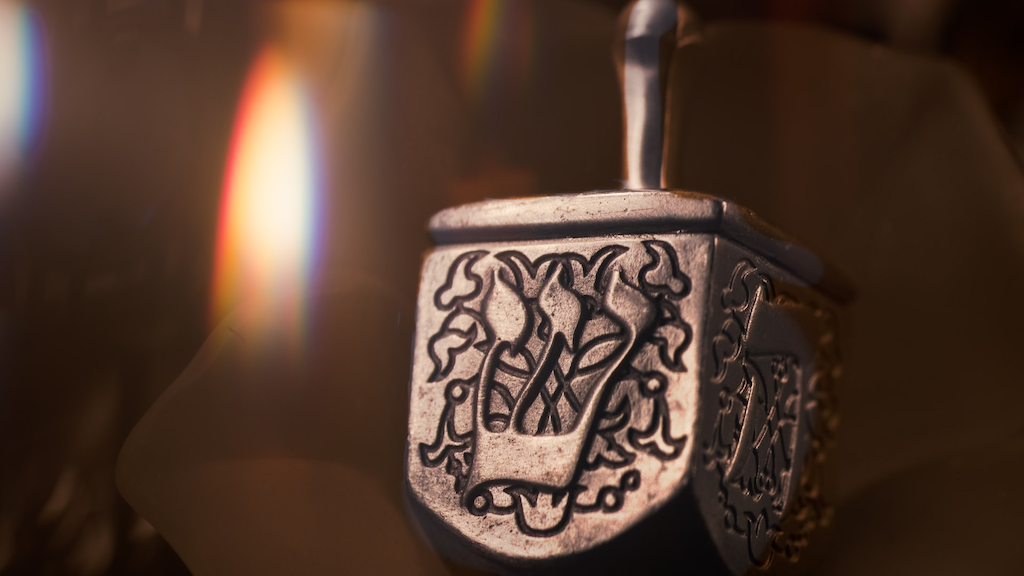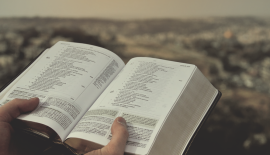Challenges and Encouragements from the Story and Miracle of Hanukkah
The eight-day festival of Hanukkah, also known as the Festival of Lights, or Feast of Dedication, has become an integral part of the sequence of Jewish holidays celebrated annually, this year from sunset on 28 November to sunset on 6 December.
As a Jew, Jesus would have celebrated Hanukkah regularly, thereby affirming His Jewish identity and continuity with His heritage. We read in John 10:22-23 that there was a feast of dedication during the winter: “Now it was the Feast of Dedication in Jerusalem, and it was winter. And Jesus walked in the Temple, in Solomon’s porch.”
Hanukkah is an inspiring story of incredible faithfulness to God and a story of awesome courage. This holiday is about a people who refused to give in and go against God’s Word. Hanukkah celebrates the rededication of the Temple for God’s people as well as their victory against a far mightier enemy, a victory that only God Himself could secure. In significant ways, it is a holiday commemorating God’s miraculous care of His people.
Hanukkah is an inspiring story of incredible faithfulness to God and a story of awesome courage.
To help us understand this miraculous story, I have drawn on a wide variety of sources in summarising the important historical context of Hanukkah. In the 4th century BC, the great military general, Alexander the Great, conquered the whole known world, and one of his overriding goals was to introduce the world to everything Greek: Greek education, language, thought, custom and philosophy; Greek theatres, chariot races, gymnasiums and stadiums.
The land of Israel was no exception. Sad to say, many Jews submitted to the lure of Hellenism and embraced the Greek culture. Alexander the Great died in 323 BC – but the Greek culture lived on, continuing to spread and to influence and control the minds of the people.
After his death at just 32 years of age, Alexander’s empire split into four parts, his four generals dividing all his conquests among themselves. One of his generals took control of the area, that later became Syria, where several generations later, Antiochus IV came into power. Antiochus IV declared himself ‘Epiphanes’, which means ‘god manifest’. So he was stating that he was divine, he was god – hardly the most humble man of the year!
In 167 BC, Antiochus ordered Jerusalem to be destroyed. Houses were burned and the city walls broken down, and thousands were killed or sold into slavery – even including those who embraced Antiochus’ ways. All up, he killed forty thousand inhabitants and sold forty thousand more as slaves.
The Temple on Mount Zion was stripped of its golden vessels and treasures, and Antiochus defiled it by erecting an idol of Zeus on the holy altar and then sacrificing a pig on the altar and sprinkling its blood in the Holy of Holies. Only swine were thereafter permitted for sacrifice in the converted shrine.
In further attempting to achieve his goal of abolishing every single trace of the Jewish religion, Antiochus issued orders forbidding circumcision, Sabbath observance, kosher diets and the study of the Torah. Any Jew who was discovered attempting to live out the Torah was immediately put to death. Sadly, but not surprisingly, many Jews gave in and, in order to survive, chose to comply with the new laws. There were others, however, who stood fast and refused to yield, who paid with their lives.
Jewish history records many courageous acts of faithful devotion. Hidden away in the mountains was a man named Mattathias along with his sons, a priestly family from the line of Aaron. From this family’s influence, a small army soon formed. Before he died, Mattathias passed on the leadership of this small band to his son Judas. Judas and his freedom fighters came to be called the Maccabees. Maccabee was not his last name. Maccabee means ‘hammer’.
When the men feared for their lives, Judas encouraged them with some amazing words that we would do well to meditate on – “It is easy for many to be overcome by few; in the sight of heaven there is no difference between deliverance by many or by few; for victory in war does not depend upon the size of the army, but on the strength that comes from heaven. With great presumption and lawlessness, they come against us to destroy us and our wives and children and to despoil us; but we are fighting for our lives and our Torah laws. He Himself will crush them before us, so do not be afraid of them.”
In 164 BC, this small group of faithful Jewish fighters won an incredible victory against the mighty Greek army, took back Jerusalem and cleansed the Temple, and then established an independent Judea, which remained independent for over 100 years until conquered by the Romans. The Maccabees knew, of course, that they were vastly outnumbered, but they trusted implicitly in God.
Having regained control of the Temple, the Maccabees began to purify it. The defiled altar was torn down and rebuilt, and the Temple was restored and reconsecrated. The rebuilt altar of incense and table were then brought back into the Temple. They burnt the incense on the altar and put the shewbread on the table, and hung the curtains. In every way they could, they prepared the house of God for His presence.
Everything was ready – except one thing. They found only one small cruse of oil. Just enough to light the menorah lamps one day – but it would take eight days to prepare new oil in the proper way. They decided to light it anyway. Amazingly the menorah miraculously burned for eight days until new oil could be prepared!
The dreidel game is a well-known Hanukkah tradition – a dreidel is a spinning top with a different Hebrew letter inscribed on each of its four sides. Jews play it as a way of celebrating their history and having fun with friends and family. On each of the dreidel’s four sides is a Hebrew letter which together stands for ‘a great miracle happened here.’ It is a popular way of helping children to remember the great miracle.
It was God who enabled and empowered the Maccabees to prevail and, in so doing, to preserve the Jewish heritage. Had it not been for our God of miracles, it is quite possible that there would have been no more Judaism and no more Jewish people or nation, and therefore no Christianity proclaiming the fully Jewish Jesus as the promised Messiah.
All through history, the Jews have faced battle after battle to maintain their very existence and have survived – in the face of persecution even from Christians. Truly we must be faithful in our calling as Christians to reach out to and bless the Jewish people. And as we are reminded this Hanukkah of God’s miraculous faithfulness to the Jewish people, let us rededicate ourselves anew to be faithful to Him as we reflect on some personal challenges and encouragements.
Anything that has our attention more than God does is idolatry
It has been said that Hellenism worshipped the holiness of beauty; Hebraism worshipped the beauty of holiness. Hellenists glorified the human body both in sport and in art. They were humanists worshipping man instead of God, in effect making men into gods. Judas Maccabeus and the people who saved Judaism opposed the enforcement of Hellenist worship, seeing it as a fundamental betrayal of Israel’s – and their – unique covenant with God.
Unfortunately, many Jews convinced themselves that they would be accepted if they compromised and became part of the crowd. We can learn much from the miracle of the oil. Have you ever seen pictures of oil spillages from tankers? Oil is unique in that it does not mix or blend with other liquids, like all other liquids do, but separates and rises to the top. The influence of Hellenism ceased with a miracle that involved oil, a powerful symbol of that which refused to assimilate.
And so the light burned in the Temple for eight days. The light that shines in our lives as followers of Jesus Christ does not come from us; it comes from our Father God. But we all know that sometimes we have things in our lives that hinder or dim that light. We are prone to set up idols in our temples, and so we need regularly to rededicate our lives to the One who has given us life.
As believers in Jesus, we must be a clear light in the darkness
We cannot shut ourselves off from our increasingly godless world. The Maccabean rebellion really began only after the Greeks defiled the Holy Temple. There are times in life, and in the turmoil of social change, when the line has been crossed, and we must resist. Knowing where and when those moments have arisen is an ongoing challenge and drives us to seek God’s guidance and wisdom.
At Hanukkah, Jews place the menorah by the window or door for others to see – in other words, it isn’t enough to not assimilate. Jews – just like Christians – must be willing to show that they aren’t ashamed of being who they are. Every believer should be an uncompromising and clear ‘light in the darkness.’ As Jesus said in Matthew 5:16, “Let your light so shine before men, that they may see your good works and glorify your Father in heaven.” We are living in days when our children and grandchildren will need to know how to stand and not back down.
Also, during Hanukkah, Jewish families light an additional candle each evening so that the light grows stronger and brighter through each of the eight nights. Let us be those who keep the light burning, not just for eight days or for a month, but throughout the year, every year. We are all called followers of Jesus to bring the light wherever and whenever there is darkness. Don’t let your light grow dim!
No cause is hopeless, so don’t give up!
The Maccabees did something that was seemingly hopeless – they had enough oil for one day, and that was that. But they lit it anyway. Something amazing happened because the Maccabees took an action that seemingly had no hope of achieving its goal. The miracle of their victory is a message of hope to those who feel helpless. No cause is hopeless.
The message? If you believe you are right, then persevere with all your strength to win your goals even though there is no evident hope of winning. Some day you may see the barriers fall. On a more personal level, many of us have experienced seemingly overwhelming difficulties of one kind or another. Financial worries, illness, depression, children in trouble, loneliness; each and all of these can seem unending and insurmountable.
The encouragement of Hanukkah, of light in the midst of darkness, is: “Don’t give in to despair; don’t give up; never stop trying.” Carry on. Keep working. Keep dreaming. And even if nothing seems to change, the very fact that you keep on keeping on builds your dignity, and then… who knows? Miracles may begin to occur, flow through us and light up the world.
When we stand on God’s Word, He gives the victory
Because they were willing to stand and not compromise, God gave the Maccabees victory. When we stand up for God’s Word and refuse to compromise, no matter how hard it seems at times, our faithful God will see us through. As Paul says in 1 Corinthians 16:13, “Watch, stand fast in the faith, be brave, be strong.” When you have done all to stand, continue to stand. The small army of Maccabean fighters trusted God and was able to regain Jerusalem.
Miracles may begin to occur, flow through us and light up the world.
Hanukkah encourages us to stand and be of good courage. We can overcome with God. “If God is for us, who can be against us?” (Romans 8:31). The Maccabean fighters consisted of ordinary people: farmers, workers, servants. So often, it is ordinary people who are willing to stand up for what is right. Many people, not all but many who have great prestige and wealth, are unwilling to lose what they have in this world – so they compromise God’s Word.
When I think of the oil miracle, I am reminded that little really is much when God is in it! When we decide to take one small step of faith, God can do miraculous things in our lives. At Hanukkah, Jews all over the world proclaim to the world the faithfulness to His people of the one true God. May we, as believers in Jesus, be continually challenged and encouraged to let others know how great is our awesome God of miracles!




